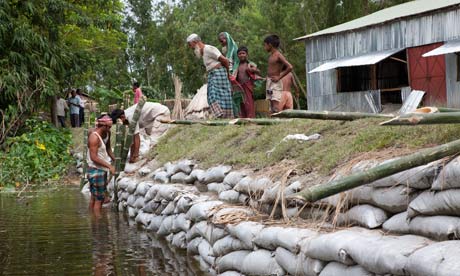The UN must make sure key anti-poverty issues stay on the agenda and help with governance and combating tax avoidance

At the UN this week, delegates will consider how the world should tackle inequality and poverty after 2015. The answer will determine the success or failure of the global fight against hunger, disease and disadvantage for years to come.
It has also stimulated a debate at a national level. What changes could the UN influence in individual countries? How you approach this varies from nation to nation. In the case of Bangladesh, where I work, there remain some key priorities.
The first is for the UN to build on its work in the battle against climate change and the rapid urbanisation that has accompanied it. Bangladesh is globally recognised as one of the countries most vulnerable to climate change. One of the many consequences of this has been the mass migration to cities as people choose to move away from the coast and other areas affected by frequent and intense disasters.
This has created a big challenge. How do we manage the rapid process of urban growth in our country? The solution, in part, lies in investing in infrastructure, including housing, schools, hospitals, clinics, roads and highways, rail, waterways and renewable energy sources.
But these decisions need to be made in consultation with grassroots communities. Their voices need to be heard too, and not just those of men and corporate business. This is a massive challenge, and one which Bangladesh is unable to tackle alone.
The second priority the UN could help with concerns women’s rights. Here, we have seen commendable progress. Women and girls in Bangladesh enjoy far better chances of getting a primary and secondary school education. However, violence against women continues to hamper progress.
Sexual harassment still prevents girls from attending school. Many of the perpetrators have impunity, and there remains the need to take greater action to address laws that continue to discriminate against the rights of women.
The third priority relates to the fight against poverty. Here, too, there has been real progress. Since the 1990s, the number of people living in poverty, as defined by the UN, has fallen by about half. In spite of this, there are about 50 million Bangladeshis living in poverty. Malnutrition remains widespread, and access, availability and affordability are major concerns in respect to food security of the poor and marginalised.
How should the UN tackle this? On one level, it still plays a fundamental role in keeping up the pressure on the global community to make sure key issues stay on the agenda. Therefore, we would like to see UN agencies continue to focus on good governance, accountability, transparency and anti-corruption and their other initiatives, but to do it in a more co-ordinated way.
We also see the UN as having a key role in investing in women’s leadership for climate solutions and focusing on the loss and damage it causes to poor and marginalised people.
On another level, the UN has a new and emerging role. It has a duty to play a part in clamping down on the tax avoidance that is starving countries like Bangladesh of the revenues needed to meet the challenges posed by poverty, climate change, violence against women and urbanisation.
For example, it is critical for the UN to campaign to ensure the G20 and other countries fulfil their commitments to get tough on tax dodging. The UN also needs to remind the corporate sector that it must play a responsible and balanced role in paying taxes.
The UN also has a responsibility to monitor how tax is spent once it has been collected. For the money to be effective, it must be properly allocated to public spending. We want the UN to help ensure that, with revenue flows of tax and aid, no national government will be able to complain that the shortage of resources is a barrier to a greater commitment to development and equity.
So, in Bangladesh, we are asking the UN to be much more ambitious for the future after 2015 and to make a difference that helps us create a fairer world.
Source: The Guardian









